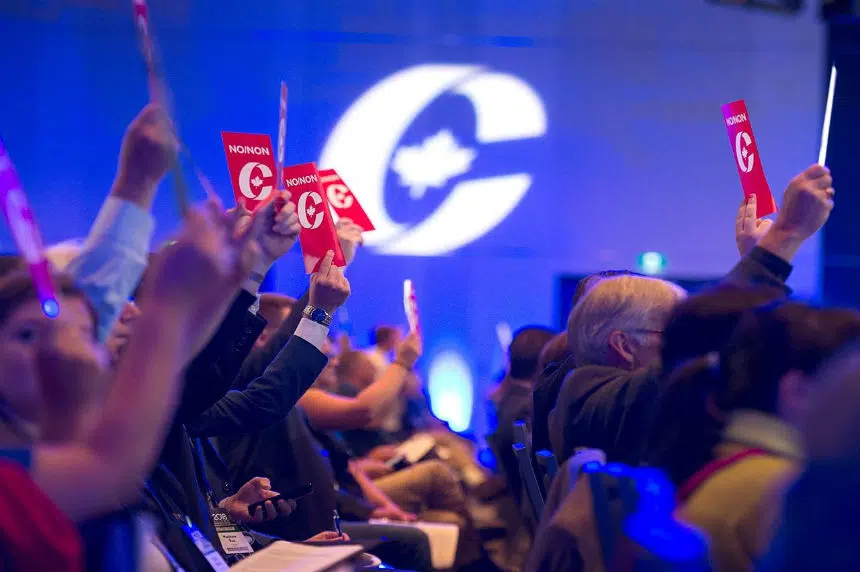HALIFAX — Conservatives will be drawn into debates about abortion and assisted dying on the last day of the party’s convention in Halifax on Saturday, thanks to proposed policy changes put forward by grassroots party members.
They will not, however, be voting on whether to kill Canada’s system of supply management.
A series of breakout sessions was held on Friday, the second day of the three-day convention, to decide which policy resolutions would go to the full membership for a vote on Saturday.
One of the 74 resolutions debated aims to remove any reference to a future Conservative government regulating abortion.
Debate was extensive during Friday’s preliminary workshop, with a number of people arguing for and against the resolution as dozens more lined up outside the overcrowded room complaining they couldn’t get in to vote.
The resolution was brought to the floor by delegates from Newfoundland and Labrador, who said they want the party to be neutral on the topic of abortion. It ultimately passed with 82 per cent support, which means it will go to the full membership for a vote on Saturday.
Another resolution to have Conservative party oppose the extension of “euthanasia and assisted suicide” to minors, people with mental illness or “people who are not competent” also passed and will go to a wider vote.
But a resolution to have the party adopt a policy to end supply management of agricultural products did not make it to the floor for a vote, much to the chagrin of a group of delegates who tried several procedural tactics to force a vote on the issue.
Peter McCaffrey of Calgary had expressed fears earlier in the week that he wouldn’t have an opportunity to vote on the resolution with Quebec MP Maxime Bernier gone from the party.
Bernier was a vocal critic of supply management and openly arraigned the Conservatives and leader Andrew Scheer for supporting it before his dramatic resignation from the party Thursday.
McCaffrey expressed his frustration with how events unfolded on Friday.
“They’ve just been running out the clock the entire afternoon, going as slow as possible, so we wouldn’t get to a supply management vote,” he said.
“I want to vote for good policy but I feel like they are pushing us out of the party by not allowing us to have votes on these issues.”
McCaffrey had previously said he didn’t want to follow Bernier out of the party, but after the supply management showdown he was less certain.
“I don’t know what to do now,” he said. “People are mad that they didn’t even get a chance to vote. People paid thousands of dollars to come here as delegates and vote on these issues and they were deliberately shut down from doing so because the party stalled.”
The party was gearing up early Saturday to vote on the top 10 resolutions that passed during the three breakout sessions held a day earlier. If the proposals garner majority support, they will become party policy.
During a morning session Saturday, delegates heard from former federal cabinet minister Jason Kenney, who delivered a blistering attack against the energy policy of Justin Trudeau’s Liberal government and Premier John Horgan’s NDP government in British Columbia.
The leader of Alberta’s United Conservative Party said current federal policy was hindering his province’s attempts to export its oil to world and domestic markets.
Kenney told the audience that for the time being there is actually a growing world demand for carbon-based fuels. He said Canada is not only faced with an economic question, but a moral one.
“I believe the world needs more Canadian energy so we are less dependent on the world’s worst regimes,” Kenney said to applause.
He then attacked Trudeau’s overall energy record and lambasted B.C.s stance on allowing Alberta oil through its ports.
“(Trudeau) surrendered to the cancellation of the Keystone XL pipeline, he killed the approved Northern Gateway pipeline, he is banning future exports form the northern B.C. coast, he killed Energy East and he is doing nothing to overcome the illegal unconstitutional opposition of the socialist government in Victoria to the export of Canadian energy.”
Kenney said what’s needed is a federal Conservative government to “undo these policies.”
Teresa Wright and Keith Doucette, The Canadian Press







